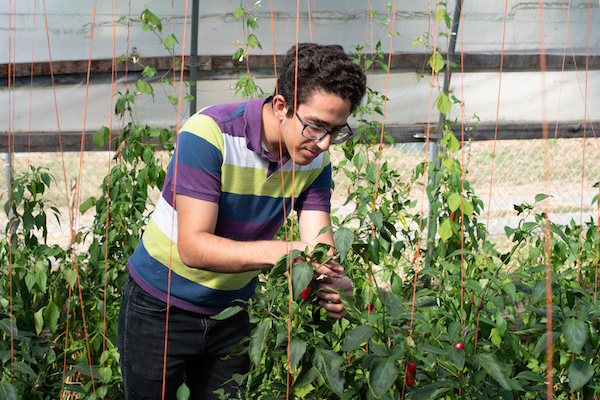President's Blog: From the Heart

Erasing a Carbon Footprint
By Eric F. Spina
I’ve learned to never doubt the knack of University of Dayton students to dream big, then take bold action — all to change a little piece of the world for the better.
So, it wasn’t surprise as much as a sense of joy when I learned that engineering students helped Mission of Mary Cooperative (MMC), a lay Marianist- and UD alumni-founded urban farming operation in East Dayton, become a net-zero energy campus — the first in Dayton.
In fact, MMC is actually net-positive because it’s returning slightly *more* renewable and clean energy to the electric grid than it consumes. MMC may harvest vegetables, but it’s reaping savings, too, as it helps the environment.
This is such a fitting achievement for a non-profit organization with a sustainability mission. Under the leadership of UD graduate Mike Schulz ’07, the Mission of Mary Cooperative transforms vacant lots into vegetable gardens. Last year, the farm harvested more than 52,000 pounds of produce, from kale to tomatoes, reducing food insecurity in the Twin Towers neighborhood. At the same time, it offered high-impact experiential learning opportunities for students intent on meeting MMC’s energy needs with renewable energy.
Three years ago, intern Joseph Dubois, then a civil engineering student, helped Schulz retrofit the building with a wide range of energy efficiency improvements before MMC invested in a geothermal HVAC system. In the School of Engineering’s Innovation Center, multiple students contributed to MMC’s journey toward a sustainable future, including designing solar energy storage for the building. “Solar ambassadors,” some in our clean and renewable energy program, worked with the national non-profit organization RE-volv to raise thousands of dollars through a crowdfunding campaign to fund solar arrays for the roof of the headquarters.
In the fall, Nathan Mansour, one of several ETHOS Center students involved in the project, took time away from the classroom to plant and harvest vegetables, help build greenhouses, *and* use special utility monitoring software to track solar production and energy consumption. Last month, the New Buildings Institute verified the data and granted MMC net-zero energy status.
“My experience was a holistic dive into the city of Dayton,” he wrote in a reflection paper. “My time on the farm served as a reminder that no actions, including those of engineers, are absent of human consequences. In solving the complex social problems, engineers have a place at the table and must contribute in order to make the world a better place.”
This is engineering that matters, what Dean Eddy Rojas calls “engineering with a higher purpose.”
Schulz gives “big props” to the students’ mentors — Kevin Hallinan, Becky Blust, Kelly Bohrer, and others — for being champions for the project. Like me, he marvels at what the future holds for these hard-working, innovative, socially aware students.
“This is a passionate moment in the their lives, and it’s a joy to educate and mentor them as students for the common good. I have no doubt these formative experiences will influence their future careers,” he said. “If they can do this, how else can they change the world?”
